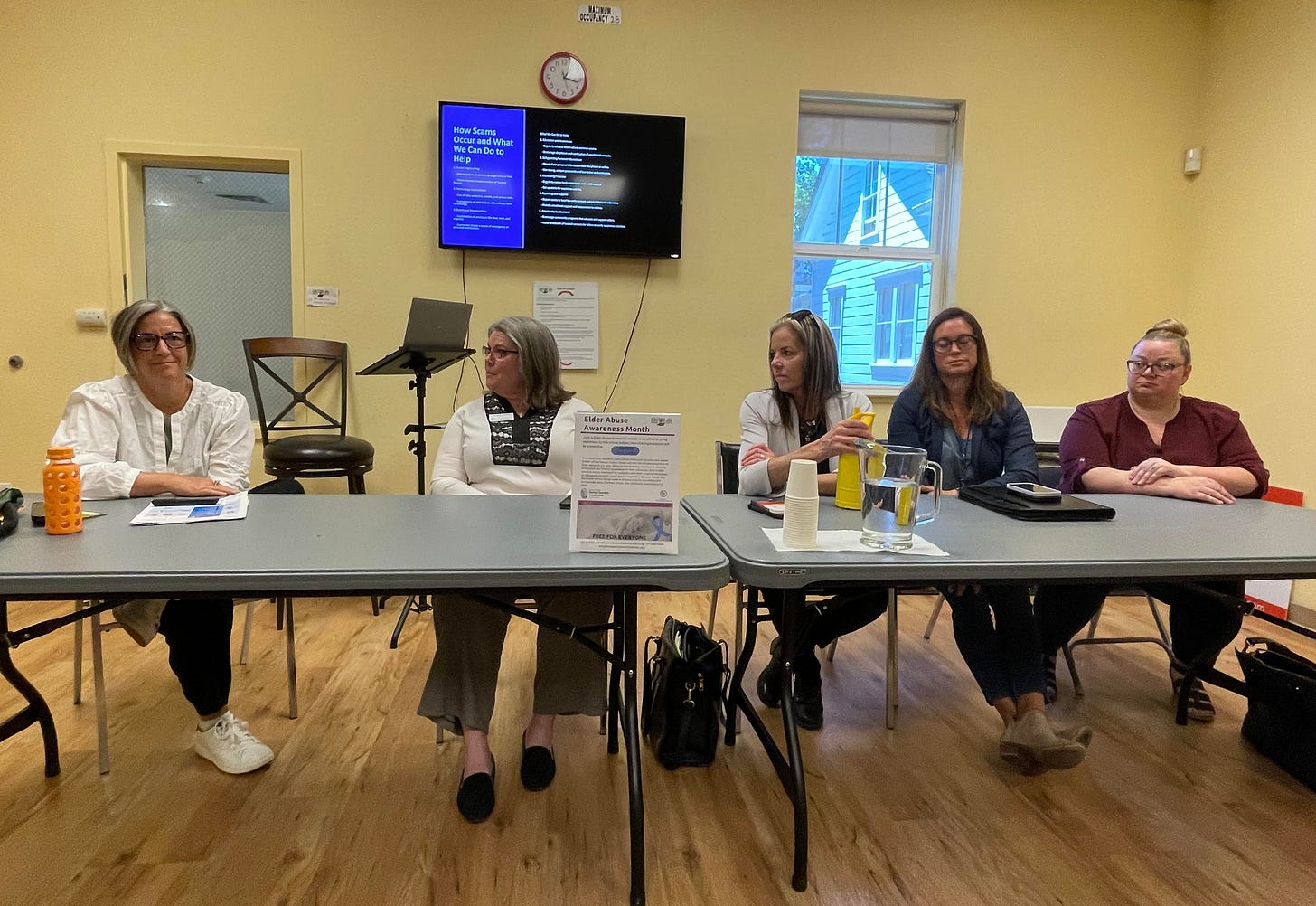Financial abuse of the elderly is on the rise in Sonoma County
A packed meeting of worried seniors at the Sebastopol Area Senior Center focused on financial scams targeting the elderly

The Sebastopol Area Senior Center hosted a panel on elder abuse on Tuesday, June 11, featuring experts from Adult Protective Services, the Family Justice Center and investigators from the District Attorney’s office. The room was packed with worried seniors, many of them frazzled from the constant onslaught of scams coming at them through their phones and computers.
Fittingly, the bulk of the presentation focused on financial abuse—primarily from the above-mentioned scams. (Liz Klaproth, activities coordinator for the Senior Center, said they’ll have a separate event on physical and psychological elder abuse later in the year.)
Tara Underly from Adult Protective Services (APS) began the presentation with some worrisome news. “At Adult Protective Services, we’re seeing a continued increase in reports that our agency is coming in contact with,” she said, noting that there had been a 9% increase from 2022 to 2023, and a 14% increase in investigations during that same time period.
She said her APS office received over 7,800 allegations of abuse in 2023, 19% of which involved financial exploitation. Forty-six percent of the financial exploitation allegations were confirmed.
Types of scams targeting the elderly
According to Underly, the amount of money lost nationally to financial elder scams was $3.4 billion in 2023.
“Mostly it’s investment scams,” Underly said, “but you’re also seeing tech scams—when you have a pop-up that says, ‘Your computer’s been infected. Please call this tech number.’ Then there are phishing scams where you’ll get emails or phone calls that are pretending to be a business, like Amazon, saying something happened with your account.”
The solution in phishing scams is to close the email or text without clicking on any links (or hang up the phone), then contact the company in question directly—for example Amazon or eBay—to check on the status of your account. (The panelists didn’t give any advice about dealing with tech pop-up scams, so I called local tech wiz Barry Chertov. His advice on dealing with tech scams can be found at the end of this article.)
Underly also noted a rise in romance scams.
“Romance scams are very big,” she said. “A lot of folks are meeting people online on dating sites, on Craigslist or Facebook or social media. And they actually think they’re interacting with someone who’s presenting a certain way. Generally, that’s not the case. It’s usually a scammer who wants to build a relationship with the individual to gain trust, to have that vulnerable adult feel like they’re in a relationship, that this is real, but after a couple of months, the scammer starts to ask for money.”
“What becomes very difficult is there’s an emotional connection,” she continued. “There’s an emotional attachment now, and that’s usually what makes it really hard for folks to step away from these scams because they don’t want to believe that they’ve been betrayed the way they have been. Millions and millions of dollars are being scammed from folks that are involved in these dating scams.”
“The caveat here is be aware that it occurs,” Underly said. “Be aware that people are out there on social media doing this. You want to vet people and make sure you are talking to who you think you’re talking to, which can be very difficult on social media. Even if you’re talking to them by phone, that can be hard. So we just want to bring this to your awareness because it is real, and people are losing quite a bit of money out there.”
Basically, if someone asks for money in the context of a “romantic” relationship over social media or email, it’s a glaring red-flag that it’s a romance scam, investigators said. One woman in the audience said that when she was recently widowed, ten “suitors” suddenly appeared on her Facebook; she wasn’t fooled though.
Underly also mentioned government impersonation scams, where the scammers pretend to be someone from Medicare, the IRS or some other government agency.
Regarding these, Underly said, “Always make sure that you’re hanging up and calling the agency directly rather than addressing it by a text or an email. And don’t click on any links!”
Cryptocurrency and money mules
The panel also warned about crypto-currency scams.
“What is bitcoin, anyway?” asked one woman toward the back of the room.
D.A. investigator Robyn Fuentes gave a brief explanation, but her colleague Lyn McCarthy told the audience simply: “If you don’t know what it is, don’t invest in it.”
Bitcoin scams often work like a Ponzi scheme, they said. After you make an initial investment, “they’ll pay you out,” McCarthy said, “but then they up the investment potential and ask you for additional money every time they have conversation or connection with you.” Eventually, after you’ve given them a large enough sum of money, say $10,000, you’ll never hear from them again.
In a new twist, the DA investigators said that bitcoin scammers have started sending couriers to people’s homes to pick up large sums of money. They said the FBI calls these people “money mules,” a riff on drug mules, and that the D.A.’s office was currently prosecuting a couple of these cases in Sonoma County.
This sounds obvious, but never hand someone at your door an envelope of cash as a part of a bitcoin transaction. Call the police as soon as someone suggests this.
If you find yourself caught up in a cryptocurrency scheme, call the police ASAP.
“I knew from a case I was involved in that if, at the moment of loss, that loss is reported to local law enforcement within 24 hours and if local law enforcement can move quickly enough, they might be able to stop the transfer of funds while it’s still in the country. But after 24 hours, it’s gone,” McCarthy said.
In general, panelists said the chance of ever getting your money back from any scam is extremely low.

Other gleanings from the experts at this event
“In my law enforcement experience, PayPal is the number-one hacked account, and the one that seems to have the most protections so far is Venmo,” Fuentes said. (She noted that she had closed her PayPal account.)
The panel also warned about trying to out scam the scammer. “Just don’t interact with them,” said McCarthy. “They’re highly skilled at manipulating people and their emotions. That’s what they do all day long.”
You can call or go online to the Social Security Administration and put a fraud alert on your Social Security number. That way you have to be contacted to give your permission for your social security number to be used to open any account or any new credit card.
Resist isolation. “One of the things that we can do for ourselves is stay engaged,” McCarthy said. “Stay connected. You know, whenever something happens that you’re worried about financially, reach out to the Senior Center, reach out to someone you know and ask for help. Don’t do it in isolation.”
Both the D.A’s office and APS are mandatory reporters, so if you want to ask about a family problem, but don’t want the police to get involved right away, call the Family Justice Center to explore your options: 707-565-8255.
If you’d like to report elder abuse, but want to remain anonymous, call APS: 707-565-5940.
Numbers to contact
Family Justice Center: 707-565-8255
Adult Protective Services (APS): 707-565-5940
Elder Law Program (Legal Aid of Sonoma County): 707-340-5610
Sebastopol Police: (707) 829-4400 (Unless it’s an emergency, in which case, call 911.)
Barry Chertov’s advice on tech pop-up scams
The panelists didn’t give any advice about dealing with tech pop-up scams, so I called local computer guru Barry Chertov, who advised simply closing the browser window—without clicking any links in the pop-up (including the little X in the top-right corner of the pop-up). When I told him that I also reboot my computer, he said, “Can’t hurt.”
“The bottom line with any scam is don’t engage,” Chertov said.




To be more precise... If you get a popup window in your browser that looks like a scam, quit your browser (not just close the window) and restart your browser, or as mentioned in the article, reboot your computer. Barry Chertov 707-206-2009.
Great article!!! Thank you so much.